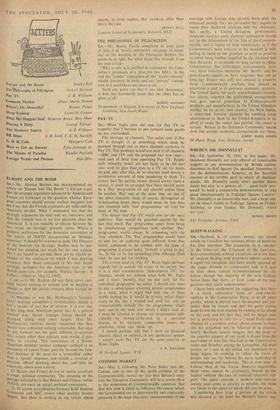20 JULY 1962, Page 15
THE PHILOSOPHY OF PILKINGTON Sta,—Mr. Henry Fairlie complains in your
issue of July 6 of 'barely perceptible mergings of mean- ing' in the wording of the Pilkington Report. No doubt he is right. But what about this example from his own article: `This is why it is justified to summarise the Com- mittee's proposals as a plan for two BBCs. In the end the "public" conception of the "public interest" would dominate in both, and no "private" concep- tion of it would have any place at all. . .
Need one point out that if one idea `dominates,' it does not necessarily mean that the other has no place at all?
ROBERT BARNARD Department of English, University of New England, A rmidale, New South Wales


































 Previous page
Previous page